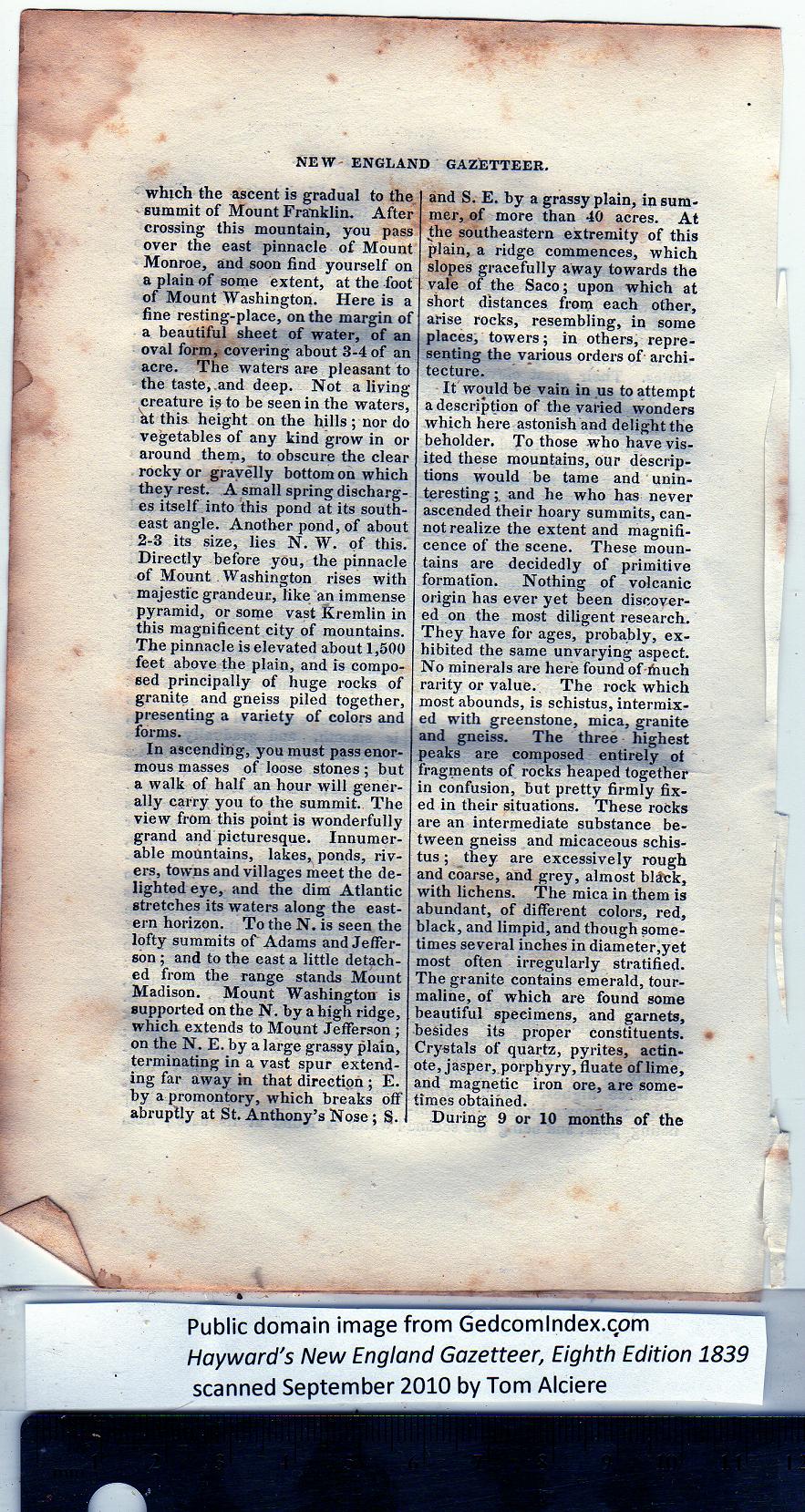|
which the ascent is gradual to the
summit of Mount Franklin. After
crossing this mountain, you pass
over the east pinnacle of Mount
Monroe, and soon find yourself on
a plain of some extent, at the foot
of Mount Washington. Here is a
fine resting-place, on the margin of
a beautiful sheet of water, of an
oval form, covering about 3-4 of an
acre. The waters are pleasant to
the taste, and deep. Not a living
creature is to be seen in the waters,
at this height on the hills ; nor do
vegetables of any kind grow in or
around them, to obscure the clear
rocky or gravelly bottom on which
they rest. A small spring discharg-
es itself into this pond at its south-
east angle. Another pond, of about
2-3 its size, lies N. W. of this.
Directly before you, the pinnacle
of Mount Washington rises with
majestic grandeur, like an immense
pyramid, or some vast Kremlin in
this magnificent city of mountains.
The pinnacle is elevated about 1,500
feet above the plain, and is compo-
sed principally of huge rocks of
granite and gneiss piled together,
presenting a variety of colors and
forms.
In ascending, you must pass enor-
mous masses of loose stones; but
a walk of half an hour will gener-
ally carry you to the summit. The
view from this point is wonderfully
grand and picturesque. Innumer-
able mountains, lakes, ponds, riv-
ers, towns and villages meet the de-
lighted eye, and the dim Atlantic
stretches its waters along the east-
ern horizon. To the N. is seen the
lofty summits of Adams and Jeffer-
son ; and to the east a little detach-
ed from the range stands Mount
Madison. Mount Washington is
supported on the N. hy a high ridge,
which extends to Mount Jefferson;
on the N. E. by a large grassy plain,
terminating in a vast spur extend-
ing far away in that direction ; E.
by a promontory, which breaks off
abruptly at St. Anthony’s Nose; S. |
and S. E. by a grassy plain, in sum-
mer, of more than 40 acres. At
the southeastern extremity of this
plain, a ridge commences, which
slopes gracefully away towards the
vale of the Saco; upon which at
short distances from each other,
arise rocks, resembling, in some
places, towers; in others, repre-
senting the various orders of archi-
tecture.
It would be vain in us to attempt
a description of tbe varied wonders
which here astonish and delight the
beholder. To those who have vis-
ited these mountains, our descrip-
tions would be tame and unin-
teresting ; and he who has never
ascended their hoary summits, can-
not realize the extent and magnifi-
cence of the scene. These moun-
tains are decidedly of primitive
formation. Nothing of volcanic
origin has ever yet been discover-
ed on the most diligent research.
They have for ages, probably, ex-
hibited the same unvarying aspect.
No minerals are here found of lhuch
rarity or value. The rock which
most abounds, is schistus, intermix-
ed with greenstone, mica, granite
and gneiss. The three highest
peaks are composed entirely ot
fragments of rocks heaped together
in confusion, hut pretty firmly fix-
ed in their situations. These rocks
are an intermediate substance be-
tween gneiss and micaceous schis-
tus ; they are excessively rough
and coarse, and grey, almost black,
with lichens. The mica in them is
abundant, of different colors, red,
black, and limpid, and though some-
times several inches in diameter,yet
most often irregularly stratified.
The granite contains emerald, tour-
maline, of which are found some
beautiful specimens, and garnets,
besides its proper constituents.
Crystals of quartz, pyrites, actin-
ote, jasper, porphyry, fluate of lime,
and magnetic iron ore, are some-
times obtained.
During 9 or 10 months of the |
